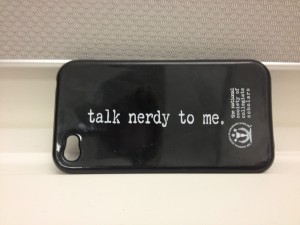Want to win the NSCS iPhone case featured above? All you need to do is read the blog post below and leave a comment! In collaboration with Fellowes, Inc. and the Identity Theft Resources Center, each blog post will award a prize to one lucky reader who comments on the post!
Smartphones: these little suckers make it easy for us to navigate the world wide web whenever, and nearly wherever. Most students are unaware of the possibility of having their identities stolen. Sure, common sense dictates that using one of the college’s computers is very risky, but did you know that identity theft is still a possibility, even when you decide to access the web via your own smartphone? More importantly, have you ever considered the endless amount of information that could be stolen from you, should you ever lose your phone entirely? Here are a few tips that could save you from having yourself stolen:
1) Password protect your smartphone!, A whopping 67% of users, according to a study by GetSafeOnline.org, apparently do not take this crucial step: You can never be too careful. It’s not just what your friends might do to your during your quick trip to the bathroom, (such as posting “I smell like a horse” on your Facebook profile), should you lose your phone, a thief would have access to your emails, your contacts.
2) Don’t reuse passwords. You may be thinking: “Oh, it’s such a pain to keep too many passwords!” You’re right, but this laziness is a free ticket for an identity thief to get hold of your Facebook, bank, and credit card information all with a single attempt.
3) Be wary of scams. Thieves may pose as trustworthy entities such as a bank or a credit card company in a scheme commonly known as phishing. Through this, identity thieves attempt to “fish” out your confidential financial/personal information via email, text, or even through social networking websites like Facebook. Be cautious: let neither fancy writing nor legit-looking graphics fool you into immediately sending a response.
4) Don’t use nicknames in your contacts. For example, if your dad’s name is “Frank,” do not label him as “Dad.” If your boyfriend’s name is “Ken,” do not label him as “Babe <3.” Would you want to give identity thieves the privilege of possibly harming those close to you as well as yourself? I don’t think so.

Be careful when talking on the phone in public areas. You never know who may be listening! Drawing created by Kendra Minoza.
5) Choose where to take calls wisely. Even the most subtle details about your life could be very useful information to persistent identity thieves. Feel free to discuss how boring math class was or how fun your afternoon date went with a friend on the phone, but be careful reciting social security numbers, credit cards numbers and other personal information.
6) Verify the apps you download. Certain apps have been designed to install keylogger software, spyware, among other kinds of software that follow the user’s activities in order to eventually obtain personal information. And be sure to verify the legitimacy of the app you are about to download: just last summer, Android users were targeted with fake Angry Birds malware apps.
7) Lastly, regardless of how tempting it may be, avoid using unsecured Wi-Fi connections. Whether you need to pay the bills or you want to buy a new pair of heels on Amazon, remember that unsecured Wi-Fi connections allow identity thieves to view all transactions made through the smartphone, thereby giving them a chance to steal your personal or financial information. And nope, not even Facebook is not the best way to kill time if you’re relying on an unsecured Wi-Fi connection!
 Kendra Minoza is currently a sophomore at Houston Community College, taking biology as a pre-pharmacy major. Additionally, she is the NSCS chapter secretary at HCC. Kendra enjoys writing, public speaking, reading, drawing, and charcoal painting. Her love for tea and lack of “normal” hobbies (such as watching TV) has made people believe that she is “an old lady in disguise.”
Kendra Minoza is currently a sophomore at Houston Community College, taking biology as a pre-pharmacy major. Additionally, she is the NSCS chapter secretary at HCC. Kendra enjoys writing, public speaking, reading, drawing, and charcoal painting. Her love for tea and lack of “normal” hobbies (such as watching TV) has made people believe that she is “an old lady in disguise.”

